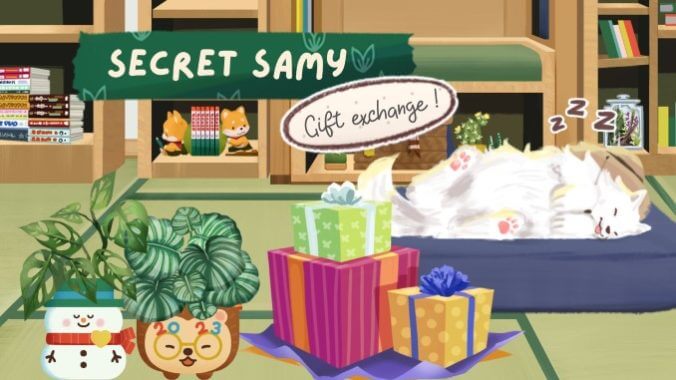Most people I know, myself included, have a love-hate relationship with mental health apps. Some have all the right features, but come with a high price tag. Some have a handful of what I need with an abhorrent amount of pop-up ads, and still others have activities that I simply struggle to find helpful. It seemed that the perfect well-being app would forever remain just out of reach until, about a year ago, Kinder World exploded on TikTok.
Kinder World is the free-to-play well-being mobile game in which players take care of virtual potted plants by engaging in activities like emotional naming, sending letters to other players, breathing exercises, or a host of other tasks. Kinder World also includes the ability to decorate your virtual home, interact with characters such as Professor Quilliam, Samy the Dog, or Professor Fern, or engage with the game’s community via in-game letters and quests, like the recently added Fern’s Expedition.
The game has been in early access for a little over a year now, and in that time span it has easily stolen my heart as my favorite mental health app. Kinder World is low commitment and driven by giving and receiving kindness—it’s a balanced blend of caring for yourself in simple, approachable ways that I’ve found more helpful than any meditation app. In the wake of my love for this game and the newly-launched community events, I reached out to members of the Kinder World team—CEO and cofounder Laura Clinnick, CPO/CTO and cofounder Christina Chen, Well-being Researcher Dr. Hannah Gunderman, and Brand Manager Jack Railton-Woodcock—to chat about the Kinder World community and what makes it stand out in the mental health app landscape.
Paste Magazine: First, hello Lumi team! Could I start by asking you to tell me a little bit about yourself, your history in game development, and your work on Kinder World?
Laura Clinnick: From data encryption to games marketing, I’ve spent many years in overwhelmingly male-dominated spaces, learning valuable lessons about how to, and how not to, run a successful business. Now, as CEO of Lumi Interactive, along with my co-founder Christina Chen—who has worked on games for longer than I have—we’ve finally been able to put those lessons to good use by carving out a space for people like us to do career-defining work in the most supportive, inclusive environment possible.
We never set out to make “just another game” or even “just another well-being app.” But we ended up working on our first major project together, called Kinder World. This idea actually came about during the dark depths of Melbourne’s record-setting lockdowns during the pandemic, when the world felt anything but kind.
Paste: Lumi Interactive is a female-founded gaming startup — tell me about your experiences being a largely female development team, good or bad.
Clinnick: It’s a sad reality that there simply aren’t many companies like us, here in Australia or abroad, and we often find ourselves in meetings with investors and senior stakeholders where we’re the only women. This issue became extremely evident while working on our seed investment, as we often weren’t taken seriously just because we were women. We even received well-meaning advice to bring a man along to pitch meetings just to have a male presence in the room. Needless to say, we didn’t do that, and we ended up securing a record-setting seed round for Kinder World.
Paste: Now could you tell me the origins of Kinder World—how you came up with the story and the idea behind a mental health mobile game?
Christina Chen: Kinder World was born during the extended lockdowns that Melbourne went through in 2020. Lauren, myself, and our art lead Mandy were the only three employees of Lumi at the time, and we discovered that our mental health was on a steep decline. We knew we needed to prioritize our own mental health, but none of the other products in the category worked for us. They were either too expensive, too time-consuming, or felt too much like homework! This means no 30 minute meditations, and no elaborate yoga routines—just very simple things like daily gratitude, emotional naming, and the occasional breathing exercise. Of all the well-being exercises in the game, we’ve found that emotional naming is by far the most popular, so we’re looking into ways to expand the feature and help players deepen their relationship with their own emotions.
Paste: What was the development process like? In developing a game about mental health, I’m particularly interested in how you might have drawn on any psychological research, personal experience or experiences of others, or DOs and DON’Ts you’ve noticed in other mental health apps?
Dr. Hannah Gunderman: It’s always been important to us that Kinder World actually works. We’re not mental health professionals, but we have been collaborating with the experts from the very first prototype of Kinder World.
I joined the Kinder World team very early on in the process as the full-time well-being researcher. My role involves staying up to date with all of the latest well-being research from across the world, and working closely with designers, developers, and artists to make sure the science is reflected in our game. The most fun part of my job is making sure the well-being science is seamlessly integrated into the game in an authentic way because we don’t want our players to feel like they’re doing homework or have to read extensive scientific literature just to understand what’s going on.

Paste: One thing I love about Kinder World is that the base game is free. It’s also something I’ve noticed highlighted in advertising. Was it difficult to develop a free game? Did you always want Kinder World to be free, and what has community response to that been like?
Jack Railton-Woodcock: One of the most important things about Kinder World is that it’s accessible to as many people as possible. We know there are lots of folks out there that would benefit from using well-being apps, but expensive subscription models sadly make them unachievable for many, especially with the cost of living going up all over the world. Making Kinder World free might not seem like it makes the most sense financially, but we think making the world a kinder place is more important than making a few extra dollars.
That said, we are a business with bills to pay, so we’ve been working hard on something that we’re calling “ethical monetisation.” So many mobile games, especially free-to-play ones, lean into predatory, coercive monetisation techniques, but we think there’s a better way! We believe that spending money in Kinder World should always be a joyful experience—never something that players feel like they have to do in case they miss out. In-app purchases in Kinder World are completely optional, and have no effect on gameplay, and we’re also going to keep the well-being aspect of the game completely free forever. We would hate for someone who relies on Kinder World for their emotional well-being to have to stop because they can’t afford it.
Paste: A pillar of Kinder World is community, which I feel like I haven’t noticed take precedence in other mental health mobile games. I’m in the Discord and love reading and sending letters in the game—what has it been like to develop this community and watch it grow?
Chen: Community is everything in Kinder World. Without the group of 60,000+ kind souls playing on any given day, Kinder World would be the same as every other wellbeing app. It isn’t an isolated experience about improving your mental wellbeing, it’s about practicing kindness to yourself and each other. Some players might be feeling a little low and could use the kindness of others, and some players might have some extra kindness to share with the community. It’s the beautiful circle of life that makes Kinder World what it is today. Dr. Hannah, our wellbeing researcher, has opened our eyes to the incredible well-being benefits of treating others with kindness—the concept of mutual aid is a big one—which is all part of our mission to make the world a kinder place.
Paste: Speaking of community, congratulations on the launch of Kinder World’s first community event, Fern’s Expedition! Is the team so excited? What was the process of designing and developing a community event like?
Railton-Woodcock: Thanks! The team is unbelievably excited about Fern’s Expedition, and the feedback we’ve had from the community has been extremely heartwarming for us all. People really seemed to love helping Professor Fern find their new forever home. Mutual aid in action!
Designing a community event is extremely complicated because we want to make sure we get it right. It was a true team effort, with team members from marketing, art, design and engineering all working together toward this common goal. For me personally, it was great reaching out to so many cozy game creators and fellow game studios to be part of our Special Guest program. Our players loved seeing these familiar faces inside Kinder World, and I’m really excited to expand on it further in 2024.
Paste: Kinder World is still in early access, but you all have managed to do a lot in terms of building an impressive game and community. Did you create Kinder World thinking it would achieve this kind of popularity?
Clinnick: There’s nothing out there that’s quite like Kinder World. It’s not quite a well-being app, not quite a cozy game, but something in the middle that we’re calling the Wellbeing Social Game. When we first came up with the idea, we had no idea how it would be received. I’d be lying if I said I expected it to become this popular, but there were some really encouraging signs early on that we were on to something special.
I think what it boils down to is that we created Kinder World to respond to a genuine need. So many people, millennial and Gen Z women in particular, were simply not getting the emotional wellbeing tools they needed from the products on offer, so when we made Kinder World, the response was incredible, and it’s grown from strength to strength. We can proudly say that hundreds of thousands of people all over the world have finally found a place to call home, where they can be accepted for who they are, and they can start to heal from the trauma of everyday life—that truly means everything to me, Christina, Mandy, and the rest of the Kinder World team.
Paste: Can you give me any hints as to what might be coming next for Kinder World?
Railton-Woodcock: The biggest milestone for Kinder World is our upcoming launch! We’re going to leave early access, and we’re cooking up so many exciting things for 2024 that I can’t talk about just yet. I can say that we’re going to be bringing more ways for people to relax, unwind, and maybe even fall asleep. You can also expect a few more appearances from our real life Samy, so make sure you keep an eye on our TikTok and Instagram to find out what we’re up to!
Maddie Agne is an intern at Paste. She has previously written about the videogame crash of 1983 and how game remakes are fundamentally different than remakes in other mediums.

